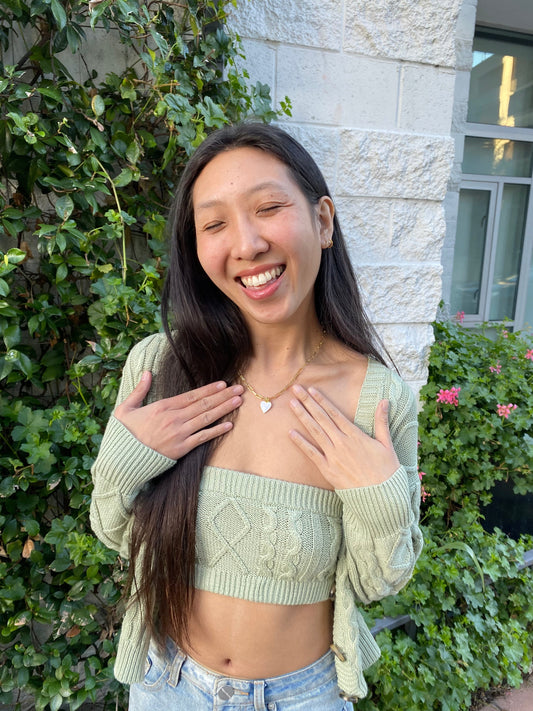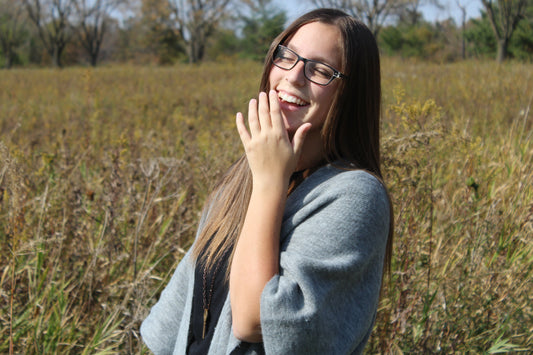When I was 13 my parents started fighting really badly and really visibly in our house. Just before I turned 15 they separated. My mom hit an all time low. I hardly saw my dad, I had to care for my mom, and I protected my sister because I needed to be her rock and show her everything would be okay, even though I wasn’t sure of that myself. We weren’t able to pay bills on time (or sometimes at all), and my mom unloaded on me because she was too embarrassed to share those intimate details with her friends. I grew up right then because I had to. We needed cabinets, so I built them. Our garage door broke, so I fixed it. My sister needed to go to the doctor, so I made the appointment. I even drove at times, though I only had my temps…but I had to.
My parents got back together a year later and to them and to everyone else it was like nothing had ever happened. To me, everything was different. It was weird having my dad back and jarring to not being in control of things anymore. My mom got better, and my sister carried on, happy to have her family back together. I was glad to have them back together too, but while I was taking care of things, I didn’t realize that a darkness crept inside me. It crept into my nerves and lived in a compartment in my brain where I stored my pain, festering for a year while I kept everything and everyone together. It became so fierce that it didn’t stay in its box for long.
I started having frequent panic attacks (not knowing what they were), but I couldn’t tell anyone because I was the rock. I was the strength. I would feel my hands and nose go numb, and start to see the darkness creeping around my eyes, making me feel like I was falling down a tunnel, so I would go into my room, shut the door, put music on and sit on my floor. I would shake back and forth, stomach tense, and cry even though I didn’t feel like crying and didn’t know why. Twenty minutes to an hour later when it passed I would see the lines on my carpet and the red, rawness of my fingertips from digging in, not realizing in the moment that I was doing that.
Then, one night, something tiny set me off. I went into my room, shut the door, and the darkness crept in further. It grabbed hold of my soul and a black voice whispered to just let go. I heard the T.V. on downstairs where my mom and sister were watching as I opened my bedroom door and walked across the hall into the bathroom. A laugh track sounded from the living room as I took a bottle of Tylenol and one of Nyquil out of the medicine cabinet, put the Nyquil down on the counter, and poured a bunch of Tylenol pills in my hand. I stood there, ready. Ready for the black hand to release my soul. Ready to feel rest. To break free.
All of the sudden I heard my sister run up the stairs and into her room, and something in me snapped. I was back to what was tangible, and no longer consumed by the dark reality inside my head. My new awareness looked at the scene in the bathroom and I broke down in tears and realized that maybe I should be okay with talking to a doctor for help. I felt so weak.
The next day I told my mom that I had made myself a doctor appointment, and after much questioning told her because I thought I had depression. She seemed sort of annoyed, but offered to drive me.
At the appointment, my mom insisted on coming in with me while the doctor asked me a bunch of standard questions, to which I answered fairly honestly: enough to give him the information needed to diagnose me, but not so honest that my full darkness was revealed. Finally, he asked me, “Have you ever had suicidal thoughts or attempted suicide?”
I paused and looked up at him. He seemed concerned. I thought this might be the chance to reach out and let someone know. Yes, I wanted to. I felt like letting go. I wanted to be strong, but give up at the same time. Before I could say anything, my mom cut me off and said, “We don’t think like that.”
Well, that was that.
I think he knew. Aside from that, I had enough symptoms and at 15 was diagnosed with depression co-morbid with anxiety, gastritis, and severe acid reflux. I was prescribed my first anti-depressants and antacids.
My darkness followed me, sometimes carrying less weight, but is still present to this day, ten years later. I’ve battled with feeling weak, with hating my medicine, with coming off of them and feeling withdrawal headaches and vomiting, only to go back on different medication, and I lost friends who thought my episodes made me a “downer” (though I told almost no one I had depression, so I probably did seem like a real shut in). I have had a few more diagnoses over the years, but continue to try new things to feel better, and fight.
Through college I was determined to find my strength and understanding. I read books about neurology so I could understand how darkness works, took pharmacology, learned about behavioral therapy, etc. Depression is such a misunderstood disorder (even by doctors), and so much negativity is associated with it. Some people even disbelieve its existence.
It’s crippling. Your brain is the organ that directly affects your mind, or your consciousness. Depression tricks you into forgetting your strength. It creates a new reality. When you break a bone: healing it takes time and a cast. With depression, if you’re really, really lucky you have people in your life who understand your darkness and see your strength and become your cast until you remember it there and heal yourself. But the difference between mental illness and broken bones is, bones heal and become whole again because your body wants them to heal, and nobody judges people for having a broken arm. With depression you always feel a little bit broken, carrying it like a weight, and people who know see you as weak. Once you gain your darkness you have to learn to live with it.
Today, I work with kids who have mental illness and try to see my darkness as a gift so that I can help them. I try to be an understanding, supportive adult for them because I never had that. Not to say I had no adult love me, just nobody who could help. I had nobody to talk to about it; nobody who truly understood.
As an adult, I have four or five close friends, a bunch of close college friends, a husband, and a loving family. My family does not know that I still deal with this darkness, that I still have bad months, just that I had to go on anti-depressants for a time when I was a teenager. They don’t know that I still take them and that I have or have ever had panic attacks. My college friends don’t even know I have depression, or that it is co-morbid with anxiety. My close friends and husband know bits of it and are all supportive, but only about three of them really understand. Even to the ones who understand, it’s hard for me to talk about.
I met one of those close, understanding friends just under a year ago at work, and after spending every day together in a professional setting, we began eating lunch together every day too, and realized how much we have in common. He doesn’t have a darkness but he gets it, somehow. I started opening up bits of myself to him, and he understood and supported me no matter what. He is one of the few people who knows about my darkness and makes me feel like it’s okay. Eventually, I met his wife and amazing little girls and they, my husband, and I all began hanging out frequently.
Knowing how amazing my friend was, I hoped his wife would also be amazing, and I was not disappointed: she is a marathon runner, a lieutenant in the army, a veterinarian, is outgoing, sweet, and fiery, and just perfect for him. She’s the kind of person who everyone instantly likes, and accomplishes everything she attempts. Months after we all started having Game of Thrones watch parties and dinner parties, etc, and I got to know her a little bit better, something changed. Two or three times from work or just hanging out at my house, my friend had to leave to go to his wife for mysterious reasons. I didn’t want to pry, but I was worried, like it was something life threatening. I gave them space, but texted my support. Weeks after the first time he had to leave, he told me that it was because she was dealing with severe depression, and I later found out that she was planning suicide.
Part of me was surprised, but another part really wasn’t, because typically people who have been struggling with mental illness for a long time are very good at hiding it, even when it gets bad. As an outsider, I saw this amazing, inspirational woman whose darkness had too tight a hold on her. She saw herself as weak and low. I told my friend to tell his wife bits about me because I thought having someone else dealing with the same thing might help. I was lucky enough to pull myself out of my longest period of grasping-for-air darkness (it lasted about five years), but at times I didn’t think I would. For years I felt so alone, and I didn’t want her to feel that way. She had to see what everyone else saw: strength. We texted back and forth and she pulled herself out of her hole and back into seeing through the dark, brain-generated cloud into what is tangible, and back to having better days. Now, I see a person stronger than I thought originally because she accomplishes more than most humans do, but with a darkness around her soul, and a black voice occasionally telling her to let go.
I gave her a giving key that reads “strength” as a reminder of what is really inside her. A reminder that dealing with it makes you stronger and it’s not a weakness, but an obstacle. After ten years, I see my darkness as a burden, the bad months as a challenge, but also as a gift to use my perspective to help people and see the world differently. I hope that this giving key can help see her that, too.


